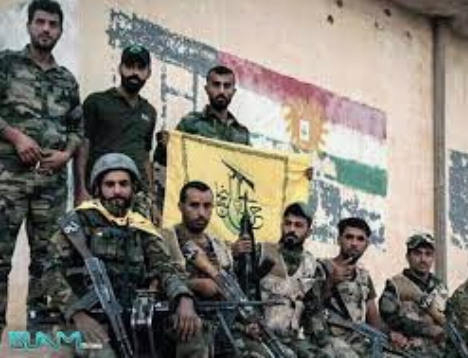The Hashd have started a new offensive to the west of Mosul.
They took
ten villages during the day. They were also expanding
the operation to the southwest. The Hashd’s goal has been to cut off the
Islamic State’s supply lines to other parts of Iraq and Syria. The problem has
been the vast area of western Ninewa it is operating in has made it difficult
to secure.
Inside Mosul the Islamic State launched another assault
across the Tigris River from west to east. The Iraqi Forces (ISF) with the
assistance of Coalition aircraft turned back the insurgents. These attacks have
become almost daily occurrences. The Islamic State’s modus operandi has always
been to attack even when it’s back is up against the wall, which is the
situation it finds itself in now.
The ISF could be adding a new twist to its planned attack
upon west Mosul. The announced strategy is a river assault across the Tigris
into west Mosul. Federal Police reinforcements
arrived in Abu Saif. These forces could be used to attack the city from the
south. The problem is the original multi-front assault upon Mosul collapsed due
to poor coordination. It’s unlikely that Iraqi planning and command has
improved since then. The police therefore may simply be a holding force for
east Mosul while other units move into the west.
Securing east Mosul is an on going concern. Five
intelligence units
were sent into the city. They will not only help screen people, but conduct
raids and searches as well. There is great concern about IS sleeper cells and
insurgents who shed their beards and uniforms and melted into the population.
New police are also required for the city once IS is expelled. The U.S. led
coalition is currently training
these units. The Spanish army is doing that at a camp in Basmaya. They are
providing a five-week course, which the commander General Angel Castilla admitted
was too short, but was the time they were given because officers are
desperately needed in Mosul.
Reuters
had a piece on the growing discontent within Mosul. Residents wanted to know
when the city would be rebuilt, but didn’t seem to have much confidence in that
happening any time soon. One resident accused politicians of selling out the
city and dividing the country. The problems facing civilians are growing.
While much has been written on life returning to the city
the deprivations people are suffering is now getting covered. The Islamic State
cut off power
to east Mosul. The power grid for the city resides on the west side, which is
under insurgent control. That means people have to turn to private generators.
Three power stations were also out of service, and would need $30 million to
rebuild. IRIN
talked about the lack of medical facilities. The city’s hospitals have been
destroyed or are out of service. The government and aid agencies have set up
temporary facilities, but they are few and far between. IRIN talked with a
family who lost three members to an air strike. A daughter survived and her
family had to walk almost six hours to a temporary medical center opened in the
center of Mosul to find care for her. It receives almost 1,500 people per day.
The World Health Organization is planning on opening a 50-bed hospital for
emergency care, but that is completely inadequate compared to the needs. The
only other alternative was to go to the hospitals in Irbil. The problem with that
is the Peshmerga are getting tougher with allowing people entry to the city.
The hospitals are also completely over whelmed anyway. One family had to sleep
over night to get in. Because the Kurdish security take people’s IDs at the
entry points to make sure they leave, they couldn’t stay in any hotels and had
to find shelter on the street. A third issue is there is no running water in
east Mosul. Again, the water system is largely under IS control. Neither the
government nor aid agencies have the means right now to deal with these growing
dilemmas. In Anbar for example, liberated cities only have basic services, but
no economies and no reconstruction forcing some people to leave. The same will
likely happen in Mosul unless oil prices start climbing higher to fill
Baghdad’s coffers.
The number of displaced continued
to rise. From January 27 to February 1 that figure went from 151,344 to
164,178. The next day it dropped by 3,000. That was still the highest total
since the Battle for Mosul began in October. Combat operations ended a week and
a half ago however, so why are people still fleeing? That’s because people are
being driven from their homes by the constant IS shelling. At the same time
there is a flow of people back. With the liberation of west Mosul coming up the
total will go up even more.
Finally, the hard work of the Oil Ministry and international
firms put
out another well fire in Qayara. IS was forced out of the area in August
and set the field afire. That leaves six wells still to be doused.
SOURCES
Abdul-Hassan, Ali, “US-led coalition trains Mosul police,
plans for IS-free Iraq,” Associated Press, 2/3/17
AIN, "Popular crowd frees 10 villages in the southwestern
desert of Nineveh," 2/3/17
- “Video..large military reinforcements up to the south of
Mosul,” 2/3/17
Georgy, Michael, “Freed from jihadists, Mosul residents
focus fury on Iraqi politicians,” Reuters, 2/3/17
International Organization for Migration, “Displacement
Tracking Matrix Emergency Tracking Factsheet #14 – Mosul Operations From 17
October To 2 February,” 2/2/17
Al Masalah, “Oil Ministry announces extinguishing well 60 in
Qayyarah field,” 2/3/17
Mostafa, Mohamed, "PMUs recapture western Mosul villages,
army holds off sneaking IS members," Iraqi News, 2/3/17
Rudaw, “East Mosul in the dark after ISIS cut national
electricity grid,” 2/2/17
Shafaaq News, “The arrive of five regiments of the joint
forces to Mosul,” 2/3/17
Westcott, Tom, “Inside east Mosul’s growing healthcare
emergency,” IRIN News, 2/2/17



No comments:
Post a Comment